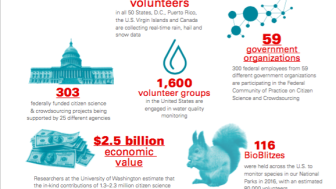David Rejeski
Global Fellow
Professional Affiliation
Former Director, Science and Technology Innovation Program, Wilson Center
Expert Bio
David Rejeski is the former director of the Science and Technology Innovation Program (STIP). The mission of STIP is to explore the scientific and technological frontier, stimulating discovery and bringing new tools to bear on public policy challenges that emerge as science advances. STIP focuses on emerging technologies and the critical choices innovation presents to public policy. Work includes synthetic biology, nanotechnology, participatory technology assessment, geoengineering, and the application of information technologies, computer games, and social media to public policy challenges.
He is presently a Visiting Scholar at the Environmental Law Institute, was a Visiting Fellow at Yale University’s School of Forestry and Environmental Studies, and an adjunct affiliated staff member at RAND. Between 1994 and 2000, he worked at the White House Council on Environmental Quality (CEQ) and the Office of Science and Technology (OSTP) on a variety of technology, R&D, and policy initiatives, including the development and implementation of the National Environmental Technology Strategy, the Greening of the White House, and the Education for Sustainability Initiative.
Before moving to OSTP, he was head of the Future Studies Unit at the Environmental Protection Agency. He spent four years in Hamburg, Germany working for the Environmental Agency, Department of Public Health, and Department of Urban Renewal and, in the late 1970’s, founded and co-directed a non-profit involved in energy conservation and renewable energy technologies.
He sits on the advisory boards of a number of organizations, including the Board on Global Science and Technology of the National Academy of Sciences, the expert panel advising DARPA’s ‘Living Foundries’ Program, NSF’s Advisory Committee on Environmental Research and Education; the NSF-funded Synthetic Biology Engineering Research Center (SynBERC); the external science advisory committee of the Center for Environmental Implications of Nanotechnology, the Committee on Science, Engineering and Public Policy of the American Association for the Advancement of Science (AAAS); the Center for Environmental Policy at American University; the National Council of Advisors for the Center for the Study of the Presidency; the Journal of Industrial Ecology; and Games for Change. Between 2004 and 2009, he was a member of EPA’s Science Advisory Board and he has served on the EPA’s Board of Scientific Counselors. He has graduate degrees in public administration and environmental design from Harvard University and Yale University and a degree in industrial design from the Rhode Island School of Design.
Major Publications
- "Governing on the Edge of Change: A Report From the Next Policy Frontier," Environmental Law Reporter, April 2013
"Communicating Science, Caveman Style,” Huffington Post, March 25, 2013 - "Bioindustrial Ecology," February 2013
- "Governing On The Edge of Change," November 2012
- "The Next Industrial Revolution," November 2012
- "Safe Science: Lessons from Nanotechnology Can Help Synthetic Biology Mature," MIT Technology Review, June, 19 2012
- "Any Big Ideas Left," September/October 2011
- "Public Policy on the Technological Frontier," 2011
- "The Molecular Economy," Environmental Forum, January/February 2010
- "An Earth Systems Science Agency," (with Mark Schaefer, D. James Baker, John H. Gibbons, Charles G. Groat, Donald Kennedy, & Charles F. Kennel), July 4, 2008
- "Who Needs Futurists When You Have The World's Fair," November 2007
- "Overseeing the Unseeable," (with Terry Davies), Environmental Forum, November/December 2007
- "A Very, Very Small Opportunity: How Science and Society Can Avoid A Collision Over Nanotechnology," Orion Magazine, July/August 2007
- "Why We Need a Corporation for Public Gaming," Gamasutra (Serious Games Source), April 2006
- "Open Source Technology Assessment or eTA," discussion paper, March 2005
- "Has Futurism Failed?" (with Bob Olson), Wilson Quarterly, Winter 2006
- "How New Environmental Technologies Can Stimulate Economic Growth," Progressive Policy Institute, December 2004
- "Environmentalism and the Technologies of Tomorrow: Shaping the Next Industrial Revolution" (edited with Robert Olson), Island Press, 2004
- "The Next Small Thing," Environmental Forum, March/April 2004
- "Making Policy in a Moore's Law World," Interview in Ubiquity Magazine, Volume 4, Issue 42, December 17 - December 23, 2003
- "E-Commerce, the Internet, and the Environment" (with Reid Lifset, co-editor), A Special Issue of the Journal of Industrial Ecology, MIT Press, Vol. 6, Issue 2
- "Long-Term Goals for Governments" (with Carly Wobig), Foresight, Volume 4, Number 6, 2002
- "S&T Challenges in the 21st Century: Strategy and Tempo," 2003 AAAS S&T Policy Yearbook, Washington, DC: American Association for the Advancement of Science
- "Changes in Pollution and the Implications for Policy" (with Jim Salzman) in: Dietz, T. & Stern, P. (Eds): New Tools for Environmental Protection, Washington, DC: National Academy Press, 2002
- Our Future - Our Environment (co-edited with Noreen Clancy), Santa Monica, CA: RAND. March 2001
- "Ecological Computing" (with John Seely Brown), The Industry Standard, December 25, 2000
- "Electronic Impact," Environmental Forum, July/August 1999
- "Environmental Policy in the Age of Genetics," (with Wendy Yap), Issues in Science and Technology, Fall 1998
- "Metrics, Systems, and Technological Choices" in: Richards, Deanna (Ed.): The Industrial Green Game, Washington, DC: National Academy Press, 1997
- "Getting into the Swing," Technology Review, January 1997
Insight & Analysis by David Rejeski
- Article
- Science and Technology
Strategic Recommendations for Federal Citizen Science and Crowdsourcing

- Past event
- Crowdsourcing
The Future of U.S. Federal Citizen Science and Crowdsourcing

- Past event
- Science and Technology
Assessing the Societal Implications of Emerging Technologies: Book Launch

- Past event
- Science and Technology
Missing the Slow Train: How Gradual Change Undermines Public Policy & Collective Action

- Video
- Serious Games
Addressing Complexity With Playable Models

- Past event
- Science and Technology
Why Safety Can Be Dangerous: A Conversation with Gregory Ip

- Past event
2015-16 State of the Future launch event

- Publication
- Serious Games
Addressing Complexity with Playable Models
- By
- David Rejeski,
- Robert Olson,
- and Heather Chaplin


